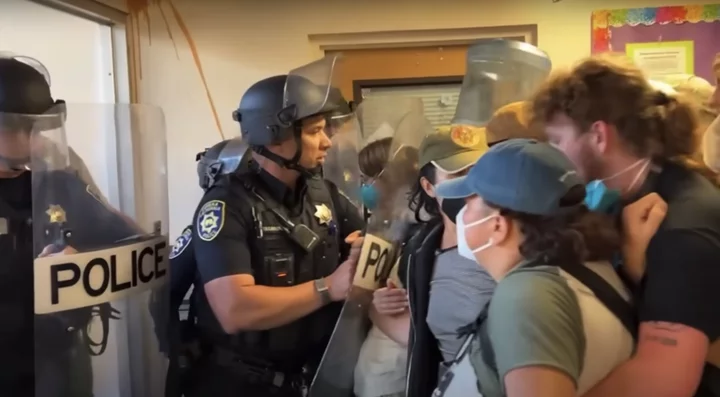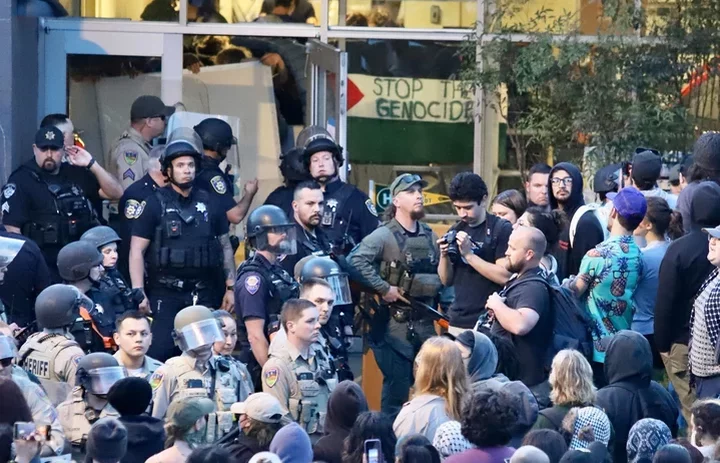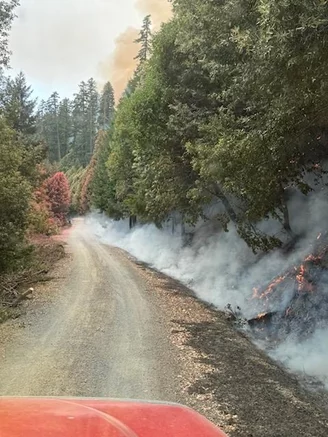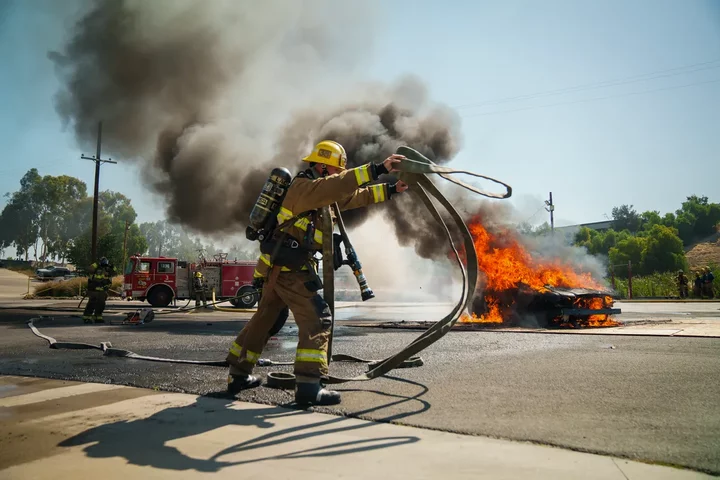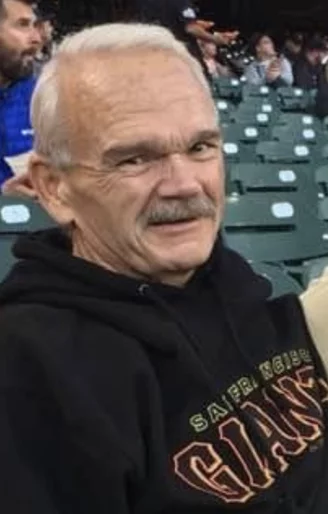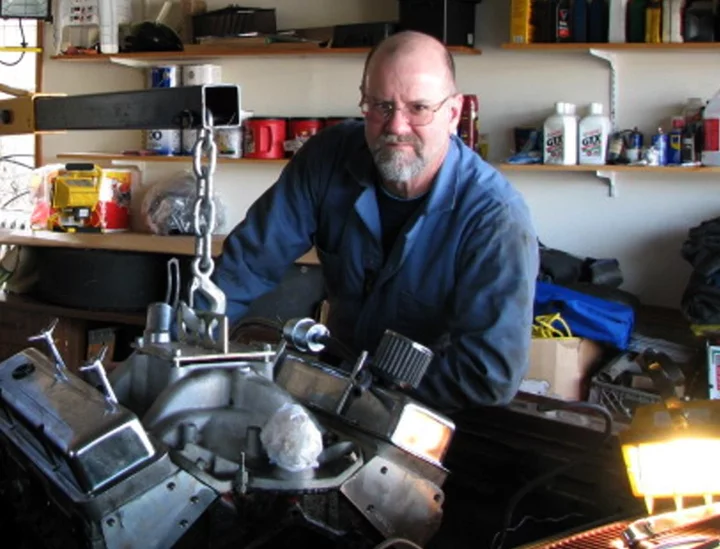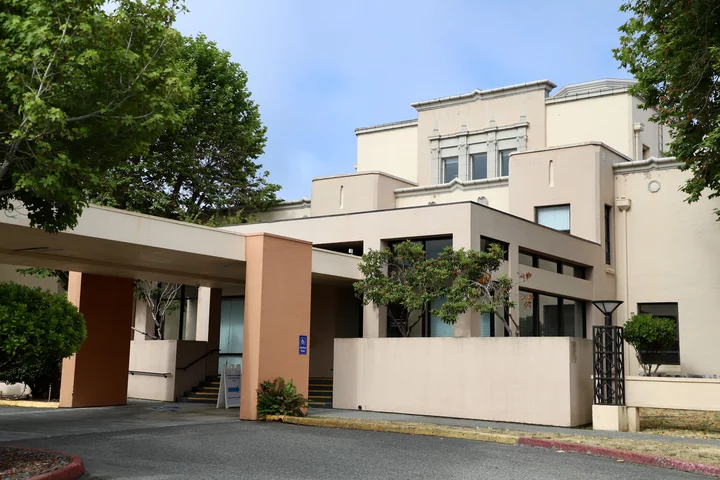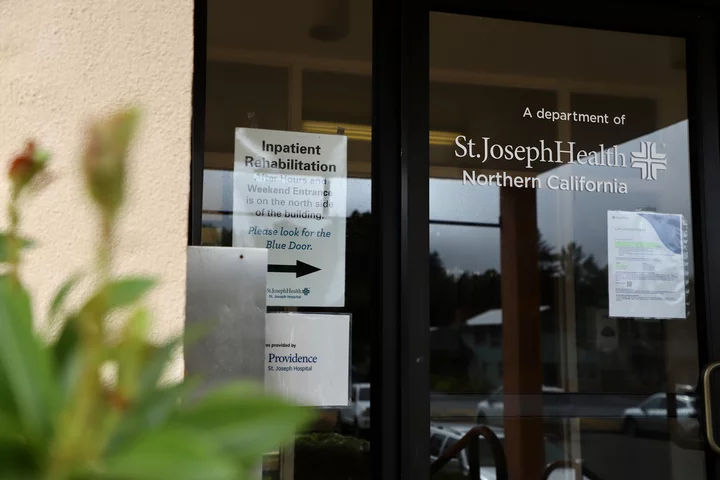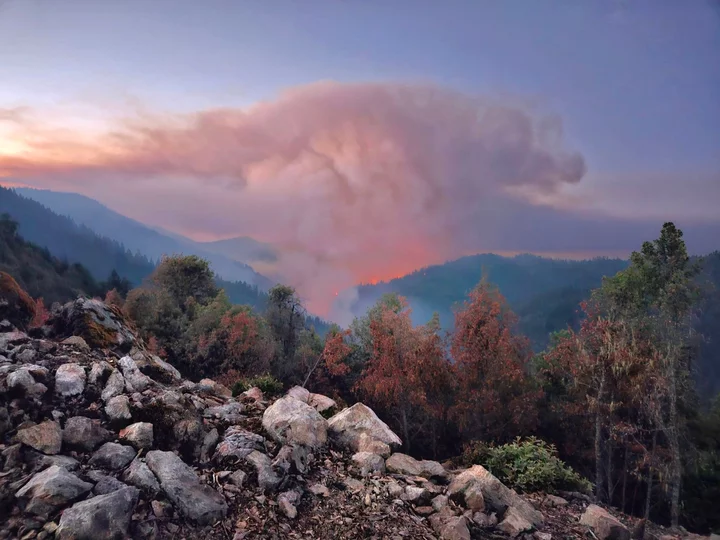Law Enforcement Showed a ‘Lack of Effective Planning and Command’ Responding to Cal Poly Humboldt Protests, Independent Review Finds
Ryan Burns / Friday, July 26, 2024 @ 2:11 p.m. / Activism , Cal Poly Humboldt , Crime
Police officers clash with protesters inside Siemens Hall at Cal Poly Humboldt on April 22. | Screenshot of video by Ryan Hutson for Redheaded Blackbelt.
###
Law enforcement’s clash with pro-Palestinian protestors at Cal Poly Humboldt on April 22 revealed a lack of effective planning and command, according to an independent review conducted by OIR Group, the Long Beach-based entity that serves as the City of Eureka’s Independent Police Auditor (“IPA”).
Of course, the Eureka Police Department was not the lead agency that responded to the campus demonstration — that would be Cal Poly Humboldt’s own University Police Department (UPD), which has not, to our knowledge, had its own independent review.
But the report commissioned by Eureka and presented to the public earlier this week found the planning and execution of law enforcement’s initial response sorely lacking.
“There was no clear unified Incident Command, and no contingency planning in place if the circumstances changed; for example, how to respond if the crowd size overwhelmed law enforcement’s capacity or protestors became violent,” the report notes. “Those in command did not account for field operation basics, such as covering all entrances to Seimens [sic] Hall, avoiding being surrounded, and providing a safe and clear path of movement for those who left voluntarily as well as arrestees.”
The report also suggests that the violent altercation — video of which, including a protester’s water jug going “boink” across a cop’s helmet, quickly went viral — could probably have been avoided altogether.
“Based on our review of available video and other evidence, there was no immediate threat beyond vandalism of University property at the time officers staged in the foyer, and no urgent need for law enforcement intervention,” the OIG report states.
The 26-page review, which you can download via the link below, offers a blow-by-blow account of the April 22 events on campus along with a list of half a dozen recommendations for the Eureka Police Department.
The writeup says that while protesters said their intention was to peacefully “sit-in” to protest the war in Gaza, those intentions “were soon overshadowed by some protestors’ involvement in vandalism of University property and their decision to barricade entrances and exits [to Siemens Hall], prompting University administration to request a law enforcement intervention.”
EPD was among several local agencies to respond to the university’s call for mutual aid. About an hour into the protest, university leadership reportedly gave the command for law enforcement to enter Siemens Hall and arrest protesters for trespassing.
According to the report, things went sideways pretty quickly. While the plan was to enter Siemens Hall from a rear upstairs door and push protestors out the front door, to be arrested by waiting officers, UPD instead directed the team through the main quad to that front door, where approximately 50 protesters had gathered in force.
As the crowd of protesters outside crowded in behind the team of officers, they saw that the foyer inside Siemens Hall’s main entrance had been blocked by heavy cabinets, bookshelves, desks and chairs. This was a surprise to the EPD officers because UPD had reported that all barricades had been removed, the report says.
“At this point, the EPD team recognized that law enforcement was significantly outnumbered,” the review continues. “The mission as initially described – to arrest 30 peaceful protestors – was not the actual situation faced by EPD officers on the ground. … Moreover, the EPD officers appeared to be the only responding team equipped with shields that were required for effective crowd management.”
As the assembled officers gathered outside, protesters yelled at them to leave, and some started throwing unopened cans of food in their direction.
“Others began to jump in unison and chant loudly, saying, ‘we are not afraid of you!’” the report says. “A protestor banged an empty water jug with a stick. Still others asserted that they were conducting a prayer ritual that could not be interrupted; one stood on the furniture and burned sage while holding an abalone shell.”
Two dispersal orders were given, but with all the noise on scene it’s unclear whether the protesters could hear them.
“Video footage from all vantage points suggested that the officers were at a tactical disadvantage, both in sheer numbers and force,” the report says. But under direction from the university, they advanced nonetheless. “The power of the surging crowd appeared to be stronger as the officers lost ground nearly immediately. Still, the officers used their shields to continue to push into the crowd.”
Protesters kicked, punched, spat and shoved; cops used their batons to poke and jab while shoving back. One officer punched a protester in the torso with a closed fist. A female officer’s knees buckled as she was pushed into a cabinet, and as she lay on the ground being choked by the chin strap of her own helmet, a protester struck her repeatedly in the right leg, according to the report. She kicked back, “possibly kicking a protestor in the groin.”
Again, the report points the finger at the university and UPD.
“[An EPD] supervisor expressed concerns about the mission several times, including concern over not having an effective arrest plan,” it says. “While UPD wanted to issue another dispersal order and begin moving or arresting the crowd in the quad, EPD and others advised to wait.”
Undeterred, UPD requested an armored vehicle and a SWAT team.
The EPD officers managed to extricate themselves, and by 10:40 p.m. they had pulled all resources from the campus.
Since OIR Group is the City of Eureka’s independent auditor, it’s official list of recommendations is directed toward the city and its police force. But the analysis doesn’t spare UPD.
”As the lead organization, UPD was responsible for planning and command, and should have created a written Incident Action Plan (also referred to as Operational Plans, or “Ops Plans”) for this event,” the report says. And ultimately, the review commends EPD as far more prepared and equipped than the university’s force.
“EPD command staff had the expertise (backed by its own First Amendment Assembly policy) needed to effectively resolve the short-term situation on campus, and to develop effective operations plans for related events that occurred in the following weeks,” the report says. “We advise that EPD use this expertise to lead the region in establishing templates for Incident Action Plans for spontaneous events.”
Perhaps surprising: The report says EPD does not have a mutual aid agreement with regional partners such as UPD.
OIR Group’s six recommendations for EPD are as follows:
- “EPD should work with its regional partners to establish templates for Incident Action Plans for various types and sizes of events that provide general strategy and working tactics.”
- “EPD should work with its regional partners to establish a Mutual Aid Agreement and a regional training plan to ensure that all parties fully understand the contours of the Agreement.”
- “EPD should develop a formal critical or major incident review process that involves a meeting of Department leaders convened after a critical incident, in which a broad range of issues are considered and identified, and which results in clearly defined and documented action items with expectations for follow-up and effective feedback.”
- “EPD should engage with the other agencies who responded to Cal Poly on April 22 to facilitate a multi-agency debrief to discuss where improvements can be made in future responses.”
- “EPD should send at least one supervisor to obtain Mobile Field Force instructor certification in Field Force Operations. Once certified, this trainer should provide a Mobile Field Force training update to all personnel.”
- “EPD should add Mobile Field Force updates to its regular training schedule (while balancing competing training requirements and staffing challenges).”
In closing, the report commends EPD for its actions during these less-than-ideal circumstances:
EPD’s role in the law enforcement response to the April 22 protest at Cal Poly was limited and, at least initially, claimed no responsibility over the planning and on-scene command. The officers and supervisor who arrived first at the University were thrust into a difficult task with little or no chance of success. And as we detail above, their use of force to get out of that situation was measured and justified.
Law enforcement officers arrested 31 protesters during the demonstrations, though none have yet been charged with any crimes. Reached by the Outpost earlier this week, Humboldt County District Attorney Stacey Eads said her office has conducted its initial review.
“Final decisions are pending further evaluation and/or receipt of additional information,” she said via email.
###
###
File photo from the April 22 incidents at Cal Poly Humboldt by Andrew Goff.
PREVIOUSLY:
- Multiple Law Enforcement Agencies on CPH Campus This Morning; Solidarity March Planned; Commencement Ceremony Status Uncertain
- In New Statement, Cal Poly Humboldt Says It Supports Free Speech But Decries ‘Lawless Behavior,’ Disruption of Education and Damages Estimated in the Millions
- Cal Poly Humboldt Issues Hard Closure of Campus; Law Enforcement Converges
- DAY FIVE: Protesters Open Cal Poly Humboldt’s Siemens Hall After Day of Tension Waiting For a Raid That Has Yet to Come
- DAY FOUR: Occupy Cal Poly Humboldt Protester Details Group’s Demands, Motivations and Views on President Tom Jackson, Law Enforcement and Their Campus Impact
- Cal Poly Humboldt Faculty Pass Vote of No Confidence in President Tom Jackson Amid Ongoing Student Protest
- DAY THREE: (PHOTOS) Student Protesters List Demands, Expand Graffiti Messaging and Voice Camaraderie on Third Day of Cal Poly Humboldt Campus Occupation
- Cal Poly Humboldt Says Campus Will be Closed Through at Least the Weekend Due to Ongoing Pro-Palestine Protests
- DAY TWO: The Morning After Cops Clash With Student Protesters, CPH Campus is Closed, Occupied Building Barricaded
- Legendary Rebellious Rapper Chuck D’s Cal Poly Humboldt Event Canceled By In-Progress, On-Campus Rebellion
- DAY ONE: Major Pro-Palestine Protests at Cal Poly Humboldt Provoke Massive Police Response; Protesters Occupy Siemens Hall; Reports of Violent Force Between Activists and Law Enforcement
BOOKED
Today: 6 felonies, 7 misdemeanors, 0 infractions
JUDGED
Humboldt County Superior Court Calendar: Today
CHP REPORTS
No current incidents
ELSEWHERE
Governor’s Office: Governor Newsom announces appointments 1.13.2026
County of Humboldt Meetings: Humboldt County Behavioral Health Board Meeting - Jan. 22, 2025
Hill Fire Grows to 7,111 Acres, Now 17 Percent Contained
LoCO Staff / Friday, July 26, 2024 @ 9:55 a.m. / Fire
Photos: Incident Command Flickr
###
As of Friday morning, the Hill Fire burning south of Willow Creek has grown to 7,111 acres with 17 percent containment.
The following additional information comes from Incident Command:
CURRENT SITUATION:
The number one priority for firefighters is the Sugarloaf Mountain area, and crews are working around the clock to the keep the fire within established dozer and handlines.
With the increased humidity and lower temperatures, tactical firing was done yesterday and through the evening, supported by aircraft. This strategy aimed to gradually move the fire down Sugarloaf Mountain toward Forest Road 5N14. This road extends north and connects with a dozer line that ties back to 6N06 Road, creating a perimeter around the fire. These operations have been successful and are ongoing. Activities have been slow and methodical as the steep terrain presents safety issues for the crews. Fire-burned trees, loose soil, and dislodged rocks call for extra awareness.
Control lines in the north, west, and south are holding firm, with crews actively mopping up and patrolling these areas. They will also focus on removing hazardous trees and those threatening the containment lines.
Contingency line construction continues to the south and along the Hennessy Ridge in the east. The Structure Defense Group has worked with local agencies to evaluate residences, roadways, and other values at risk.
WEATHER:
Today, conditions will get better with more marine influence. The inversion layer will help humidity levels go up, reaching mostly above 30 percent during the day. Temperatures will also drop, staying mostly below 80 degrees. Winds will be mostly influenced by the terrain, blowing from the northwest at higher elevations in the afternoon.
EVACUATIONS:
Humbolt County: Evacuation order and warnings remain in effect. For current updates on evacuations, visit https://www.facebook.com/HumboldtSheriff and https://humboldtgov.org/2383/Current-Emergencies.
Trinity County: Evacuation warnings remain in effect. For current updates on evacuations, visit https://www.facebook.com/profile.php?id=100064589806351 and https://www.trinitycounty.org/OES.
Conditions are subject to change at any time, visit https://protect.genasys.com/search for a full zone description. Sign up for Humboldt Alert emergency notifications at https://humboldtgov.org/2014/Emergency-Notifications.
CLOSURES:Forest Closure Order currently in effect for the area impacted by the Hill Fire. It is temporarily prohibited to be on any national forest system land, trail, or road within the closure area.
To view the closure order and map of closure area visit the following link www.fs.usda.gov/Internet/FSE_DOCUMENTS/fseprd1191963.pdf.
Road closures are currently in place on Friday Ridge Rd. at Forest Service Route 6N06, Friday Ridge Rd. at Forest Route 5N01 and Friday Fridge Rd. at Forest Route 5N04. For updated road closure information, visit protect.genasys.com or humboldtsheriff.org/emergency.
FIRE RESTRICTIONS:
Forest fire restrictions also went into effect on July 12th . Campfires and stove fires are restricted to those developed areas listed in the forest order located at https://www.fs.usda.gov/Internet/FSE_DOCUMENTS/fseprd1188610.pdf.
Smoking, welding, and operating an internal combustion engine also have restrictions in place.
Newsom Set an Ambitious Goal to Launch 500,000 Californians Into New Careers. Many Are Firefighters
Adam Echelman / Friday, July 26, 2024 @ 7 a.m. / Sacramento
A car burns during a training session as an apprentice lays out a fire hose at the Los Angeles County Fire Department East County Training Center, in Pomona, on July 8, 2024. Photo by Jules Hotz for CalMatters
Flames curled around a white 1997 Buick as the airbags exploded, sounding like gunshots. The tires popped next, sending metal pieces flying. Four men battled the blaze, shooting water through a firehose while Captain Michael Chapman looked on.
By the end of the day, he said, this training academy of the Los Angeles County Fire Department will torch 10 cars.
Not only is the training free for these firefighters-in-training — they also get paid. They’re in an apprenticeship program, which means they learn on the job.
It’s a model that’s gaining new attention. During his 2018 campaign, Gov. Gavin Newsom said he would create 500,000 new apprenticeships in the decade after taking office. Firefighting is the most popular so far, with nearly 18,000 apprentices joining programs since Newsom’s inauguration in January 2019, according to Adele Burnes, the deputy chief of the state’s Division of Apprenticeship Standards. As of this month, she said the state has registered more than 180,000 apprentices across all industries in the last five years.
The California Firefighter Joint Apprenticeship Committee helps create these firefighter apprenticeships by bringing together local fire departments and their union leaders, who jointly set the terms for apprentice pay and training. The state subsidizes apprenticeship training just like it subsidizes public colleges and universities.
Learning without getting burned
Today, the majority of professional firefighters in California are trained through apprenticeship programs, said Yvonne de la Peña, who oversees the joint committee. She said getting to that point took more than 30 years of incremental work, negotiating apprenticeship agreements department by department.
The 36 Los Angeles County apprentices all men, each with the same buzz cut. After every lesson in their 18-week training program, they split into small groups and line up in rows, where their instructors shout commands.
“We have to be militaristic,” Chapman said. “Someone has to take charge.”
The pay varies, but in large fire departments, apprentices can make more than $40 an hour, according to de la Peña. Once they finish apprenticeship training, they get a raise.


First: A car burns during firefighter training. Last: An apprentice carries a saw. Photos by Jules Hotz for CalMatters

Apprentices work to extinguish the flames on a burning car. Photo by Jules Hotz for CalMatters
The state reimburses the departments for some training costs, typically about $10 an hour for each hour of training. In the 2022-23 budget year, which ended last June, the state gave fire departments a total of more than $24 million for apprenticeship training, according to Melissa Villarin, a spokesperson for the California Community Colleges Chancellor’s Office. The money passes through education agencies because it comes from Proposition 98, the same source used to fund K-12 education and community colleges.
In addition to its hourly reimbursement, which is provided to almost any registered apprenticeship program, California allocated around $130 million for apprenticeships in the last budget year. Most of that money went to programs that help diversify apprenticeships or to industries that are interested in launching an apprenticeship model for the first time. It’s part of an unprecedented state investment in apprenticeships in recent years.
In Los Angeles County, the fire department didn’t qualify for many of those grants, but it received over $4 million from the state for training reimbursement.
A few hours after quenching the car fire, the apprentices rotate to other lessons, including the most dangerous one: a burning building. For that section, instructors outnumber students. “The last thing we want is to burn one of them,” said Chapman, pointing to the apprentices. “Or burn one of the staff.”
To simulate a burning building, the instructors use shipping containers, lining sections of the interior walls with wooden pallets and sound boards, then lighting them on fire. Four apprentices run from a fire truck in the parking lot toward the shipping containers, carrying a firehouse between them, and crawl inside, one-by-one, escorted by their instructors at the front and the rear of the line.
At one point while inside, the firehose snags a corner, but the apprentices struggle to communicate with one another to ask for more slack.


First and last: Apprentices, in yellow helmets, run a hose over to the entrance of a shipping container during training. Photos by Jules Hotz for CalMatters

Several instructors take off their gear and cool off between training sessions. Photo by Jules Hotz for CalMatters
They lose about 30 seconds but put out the fire nonetheless. They exit the shipping container slowly, too exhausted to run, then they strip off their uniforms and dunk their heads into a trash bin filled with ice water. Both apprentices and instructors are dripping in water and sweat as they sit down to debrief the lesson.
“Did they not hear you or did you not understand?” said instructor Zack Balderrama, referring to the moment when the firehose got stuck.
“Both,” said a group of four apprentices, in unison.
‘Parallels’ to education
On-the-job training has long been a part of firefighting, said de la Peña, with the joint apprenticeship committee. “The apprenticeship model hasn’t changed how someone becomes a firefighter.” The difference, she said, is that now fire departments are reimbursed directly by the state for some of their training costs. Their training is more standardized and union leaders play a larger part in determining it, she said.
Some industries, such as carpentry, have also created robust apprenticeship programs. Since 2019, the state has registered roughly 14,000 carpenter apprentices, said Burnes, with the state standards division.
Industries such as firefighting and carpentry will continue to add apprentices, but not at the scale needed to meet the governor’s goal of 500,000. “If we do nothing and maintain the status quo, we will serve approximately 330,000 apprentices by 2029,” wrote state agency leaders in a 2022 report. One of the solutions, they wrote, is to “expand new and innovative apprenticeships,” in fields such as education, health care, and technology.
Teachers and firefighters have few skills in common, but when it comes to forming apprenticeship programs, Burnes said there are “parallels.” Both industries are primarily composed of unionized, public sector employees who are spread out across hundreds of independently governed districts.

Apprentices turn to walk to their next lesson. Photo by Jules Hotz for CalMatters
California — population 39 million — currently has two teacher apprentices, according to the organization, and they’re registered with the federal government, not the state. California has yet to certify an apprenticeship program for K-12 teachers, Burnes said. “There’s a whole system of teacher credentialing in California. That’s a different nut to crack.” The goal, she said, is to create a pathway for students to earn while they learn, without diminishing the quality of the state’s teaching credentials.
In health care, Burnes pointed to one promising program, which trains licensed vocational nurses to become registered nurses. She said it has enrolled 84 apprentices since 2016.
Making room for women in firefighting
To train in Los Angeles County, the 36 apprentices needed to pass physical agility, medical and written tests, and to be certified Emergency Medical Technicians or paramedics before starting training. Many took over 20 different written exams, in multiple counties and states, waiting years just to get hired with a department. This particular class of apprentices took its written exam in 2019.
The greatest challenge is often physical. During training, apprentices must prove they can carry ladders, chainsaws, and hoses while wearing heavy uniforms, helmets, and oxygen tanks — in over 100° heat.
Initially, the fire department accepted 56 people, but in the first few weeks of class, 20 apprentices either got injured or failed to meet the performance requirements. Among those who failed was the sole woman.
“Everybody is held to the same standard,” said Chapman, adding that both men and women struggle with the physical agility exam and apprenticeship training. “Size or gender has nothing to do with it.”
While the governor’s goal focuses on the volume of apprentices in California, state agencies and fire departments are also concerned about diversity. Apprenticeships help train people for high-paying jobs, but historically, the industries that offer apprenticeships have been male-dominated. In firefighting and construction, for example, just 4% of apprentices are women, according to the state’s 2022 report.
Diversifying those industries and creating new apprenticeship programs in female-dominated industries, such as education, can help close the pay gap between men and women, Burnes said.
Through a 2017 bill, the state Legislature required the California Firefighter Joint Apprenticeship Committee to create programs that prepare applicants, especially women and people of color, for firefighter jobs. Last year, the Los Angeles County Board of Supervisors called on its fire department to do the same.
Today, de la Peña said the joint committee offers classes in San Diego, Sacramento, and Los Angeles, where students can get certified as a paramedic and practice for the other components of the firefighter apprenticeship.


Apprentices’ gear and a helmet are laid out on a bench. Photos by Jules Hotz for CalMatters
For Michaela Levell, a student in Los Angeles, the greatest benefit is the cost. “It’s free,” she said, referring to her paramedic class, and she’s able to continue working as an EMT since school is only three days a week. The UCLA paramedic program nearby is four days a week and costs about $13,0000.
Growing up in Indiana, Levell said she didn’t see any other women in the fire service so she decided to go to college and study social work instead. “It’s a daunting thing to know how few females there are in the fire department,” she said.
After getting her bachelor’s degree, she has around $50,000 of debt and said she wishes she had pursued a firefighter apprenticeship earlier. Once she moved to Los Angeles, she came across female firefighters through her EMT work. She said they’re some of “the most badass women I’ve ever met.”
###
Adam Echelman covers California’s community colleges in partnership with Open Campus, a nonprofit newsroom focused on higher education.
Financial support for this story was provided by the Smidt and Irvine foundations.
CalMatters.org is a nonprofit, nonpartisan media venture explaining California policies and politics.
OBITUARY: Mike Hess, 1959-2024
LoCO Staff / Friday, July 26, 2024 @ 6:56 a.m. / Obits
Mike Hess (Allan Peter Hess Jr.) was born on August 24, 1959, and passed away on July 6, 2024, at the age of 64. Beloved by many, Mike’s life was marked by his deep connections to his family, friends and community. Growing up in the timber industry, Mike also spent a few years as a commercial fisherman, venturing up to 1,300 miles west of Eureka for albacore and heading north to Alaska for crab in the spring.
Alongside his professional endeavors, Mike was a long-time sponsor for Alcoholics Anonymous (AA), providing encouragement and support to those on their journey to recovery. His passion for working with his hands led him to create beautiful wooden cutting boards, which he often gifted or sold locally. Mike also enjoyed Abalone diving when there was a season.
Mike was born in Arcata, to Allan “Pete” Hess and Billie Ann Toler. He leaves behind a legacy through his son, Jake Hess of Frisco, Texas, and his two step-daughters, Jennifer Pifferini and Jeneice Kessel, both of Eureka. Mike cherished his six grandchildren: Aysa, Eli, Murphy, Kylie, Easton, and Damian.
Nine years ago, Mike met the love of his life, Rayanne Leedom, and together they shared numerous adventures, often accompanied by their beloved dogs, especially Mike’s black Lab, Rio. Rayanne’s unwavering support and care were a cornerstone of Mike’s final years as he battled amyloidosis, a rare disease that ultimately claimed his life.
In addition to his family, Mike’s life was enriched by his many friends and his love for the Giants. He attended Jacoby Creek Elementary School and Arcata High School and found fulfillment in running his own business, Hess Tree Service. Despite his illness, Mike remained committed to his sobriety, attending AA meetings up until the end. His ability to connect with people and his desire to help others left an indelible mark on those who knew him.
Mike was preceded in death by his mother Billie Ann Toler & his step-brother Gary Bates. Mike is survived by his father Allan “Pete” Hess, stepmother Shirley Hess, siblings Deb Cawvey (Gerald), Susie Hess Matson (Larry), Barbie Taylor (Stacy), Angela Yates (Gene), Jenifer Boak (John), Gerald Bates and numerous friends who he considered family.
A celebration of life will be held on Aug. 3 at 1 p.m. at the peace officers association in Freshwater. In honor of Mike, donations to a favorite charity are requested in lieu of flowers.
###
The obituary above was submitted on behalf of Mike Hess’s loved ones. The Lost Coast Outpost runs obituaries of Humboldt County residents at no charge. See guidelines here.
OBITUARY: Daniel J. Hodge, 1949-2024
LoCO Staff / Friday, July 26, 2024 @ 6:56 a.m. / Obits
Please join me in prayer and in saying goodbye to one of our brothers-in-arms, Daniel J. Hodge, born January 16, 1949 and passed July 5, 2024. He served in the Navy SEABEES unit, building camps for soldiers in Vietnam. He served two tours.
Hodge Brothers — Daniel and brother Scott — were avid racers at Samoa Race Track and won trophies and races. Daniel had a ‘65 El Camino and Scott had a red Chevy Nova. This was a great love of theirs and they often dreamed and talked about the younger years of working on cars and swapping engines from burn outs to magnificent working order.
Daniel leaves behind his loving wife, Linda; four brothers and sisters, Gary, Scott, Iris and Debra; granddaughter Kirin Aurealis; and two great-grandchildren, Miranda and Milo; as well as many kind friends and neighbors. He was greatly loved and will be missed by many.
###
The obituary above was submitted on behalf of Daniel Hodge’s loved ones. The Lost Coast Outpost runs obituaries of Humboldt County residents at no charge. See guidelines here.
Partly Built New Acute Rehab Building at Redwood Memorial Scrapped, and Providence Employees Say Inpatient Rehab May Be Eliminated Altogether
Ryan Burns / Thursday, July 25, 2024 @ 3:52 p.m. / Health Care
The General Hospital Campus, located north of Providence St. Joseph Hospital on Harrison Avenue in Eureka, currently houses the only inpatient rehabilitation facility in the city. The building does not meet the state’s current seismic standards. | Photos by Andrew Goff.
###
More than six years after Providence broke ground on a brand new, 12,000-square-foot Acute Inpatient Rehabilitation Addition at Redwood Memorial Hospital in Fortuna, construction has been halted, and plans to complete the facility have been canceled.

The inpatient rehabilitation unit is among a variety of patient services still being offered in the General Hospital campus.
Meanwhile, Providence employees at St. Joseph Hospital in Eureka say the existing inpatient rehabilitation unit, which is housed inside the old General Hospital campus, just north of the main St. Joseph Hospital facilities on Harrison Avenue in Eureka, may soon be eliminated, too — though they’ve been unable to get confirmation from management.
Rumors of these developments started spreading on social media about two weeks ago, as registered nurses and other Providence employees reported that jobs and services may soon be eliminated.
“The CEO [Michael Kelemen] told us they have stopped building at Redwood Memorial and do not anticipate restarting that building,” said one hospital employee who spoke to the Outpost on condition of anonymity for fear of losing her job. (We’ll call her Jennifer.)
The inpatient rehabilitation unit — which is where occupational therapists, physical therapists and other care providers help patients recover from strokes, surgeries, physically debilitating accidents and more — is among a variety of services still being offered in the old General Hospital campus. Jennifer said the unit employs roughly 40 people, including case managers, social workers, speech therapists, physical therapists, occupational therapists, registered nurses, dietitians and more.
But the General Hospital building doesn’t meet the State of California’s current seismic standards. Providence, the not-for-profit Catholic health care system that took over St. Joseph Health in 2016, previously estimated the cost of seismic retrofits at its Humboldt County facilities alone at more than $180 million.
Construction of the new facility in Fortuna proceeded in fits and starts over the least eight years, but Jennifer and other employees reached by the Outpost said costs ballooned during COVID and skyrocketed even higher in recent years.
“So we don’t know much — just that admin went around to a couple huddles and told them they’re abandoning the construction project at Redwood,” said Julia Minton, an organizer and membership representative with the National Union of Healthcare Workers (NUHW).
“From there, people kind of run with that information,” Minton said. “We also heard that Providence is on an extension, [that] they got a variance to continue operating [from inside General Hospital] past the state deadline because it had that plan in place.”
This variance for compliance with state seismic regulations was contingent on active construction of the new facility, so when word came that the project is being abandoned, “that’s where people jumped to the assumption that General Hospital is getting closed now or by end of year,” Minton said.
We sent Providence a list of questions via email, asking specifically whether the local inpatient rehab unit will be closed and, if so, where patients who need those services might be sent, how many employee positions will be eliminated, and when these changes might happen.
In response, an L.A.-area Providence spokesperson named Patricia Aidem sent a statement that didn’t really answer those questions, though she did confirm that the construction at Redwood Memorial will not be completed:
Providence St. Joseph Hospital, Eureka, like all other hospitals in California, is subject to meeting structural seismic compliance standards by 2025. We have communicated with caregivers and the community that the General Hospital campus is not seismically compliant, requiring services to be discontinued in those buildings by the end of 2024.
We are proactively collaborating with the State to keep them informed of progress toward compliance, which included the relocation of the Acute Rehabilitation Unit to Providence Redwood Memorial Hospital in Fortuna.
Due to several external factors, we are unable to move forward with the project at Providence Redwood Memorial Hospital.
We’ve engaged internal stakeholders and community members to identify potential solutions to maintain this critical service in Humboldt County and are currently exploring the options.
We are committed to keeping our caregivers and the community informed as we navigate this process and determine the most effective way to move forward.
The Outpost called Aidem late last week in hopes of getting more details, but when we asked whether St. Joseph Hospital’s inpatient rehab unit will be closed she said she couldn’t answer that. Why not?
“Because I’m sitting about three or four hundred miles south of there,” she said. “This is what I was advised to share with you.”
On Monday we emailed local Providence spokesperson Christian Hill, hoping he might have more information. He responded via email earlier today, saying simply that the above statement “is our most up to date information.”
Local employees say they’ve also been left in the dark, and they’re not happy about it.
“It is absolutely cruel of the hospital to treat its staff in such a disrespectful way, not letting them know what their future is,” Jennifer said. “They are neither confirming or denying that the unit is closing.”
Minton said she’s been unable to get answers, either. “I have been feeling very much like Donald Rumsfeld,” Minton said, referring to the former Secretary of Defense’s oft-quoted remarks about “known unknowns” and “unknown unknowns.”
“It’s really disrespectful,” Minton said. “People are freaked out.”
The rumor mill among local health care workers has been further fed by a leaked July 1 memo from Granada Rehabilitation & Wellness Center in Eureka to its employees. The memo, signed by administrator Alice Brasier, announces a new collaboration with “Providence Hospital” on a “rehabilitation enhancement program called The Step-Down Unit.”
Reached by phone last week, Brasier said she had no comment on the memo or the collaboration with Providence.
Minton said this memo “freaked a lot of people out,” though she suspects that the new step-down unit it references is probably not intended as a replacement for Providence’s existing inpatient services. Nevertheless, she said, the prospect of collaborating with a skilled nursing facility (SNF) has local nurses and providers worried.
“Every physical therapist and occupational therapist I’ve spoken to does not want to see us partnered with a SNF,” Minton said, “mostly because they’re terrible operators. They’re not good institutions, especially the ones we have locally. They’re unabashedly greedy.” (See news reports here, here and here for more info on that.)
A sign directs patients to the inpatient rehab unit inside the old General Hospital building.
We shared a copy of Providence’s PR statement with Jennifer, who took particular notice of the part claiming that administrators have “engaged internal stakeholders and community members.”
“I don’t know who’s a bigger stakeholder than the staff who’ve been on that award-winning unit and the patients we serve,” she said.
Established in 1987, the Acute Inpatient Rehabilitation Program has cared for almost 10,000 patients from across Humboldt County and beyond, according to Providence. The program treats conditions such as major trauma injuries, brain injuries, amputations, neurological disorders, burns, spinal cord injuries and more. In 2020, the program ranked in the top tier nationwide for overall patient satisfaction.
“Its value is priceless for the community,” said Bonnie Hamant, a registered nurse who works at the facility. “By community I mean from Fort Bragg to Hoopa and all areas in between. What we have been able to give to patients is their independence and life back. Nothing is more precious for a patient recovering than to see a positive future, not a nursing home wall.”
Jennifer said she’s heard that Providence may either collaborate with a local skilled nursing facility or rely on regional support by sending patients (and maybe some of their family members) down to Queen of the Valley Medical Center in Napa or the Providence-run hospital in Santa Rosa.
Neither would be an adequate substitute for the services offered locally for the past 37 years, she said.
“I personally am afraid that this is just another notch of what they’ll do,” Jennifer said.
“Providence does this every time,” Minton agreed. She referred specifically to the closure of Providence’s outpatient labs earlier this year and the 2021 closure of the birthing center at Redwood Memorial. In each case, Providence promised that no jobs would be lost. Minton said that while that may technically be true, employees were typically offered lower wages for new positions that required entirely different skillsets.
“One LDN [labor and delivery nurse] affected by the Redwood closure, they turned around and offered her a nursing assistant position, which was a third of her salary pay cut and a huge demotion,” Minton said.
Minton was hopeful that she’d get more information today. She texted the Outpost this afternoon with this update: “All we got from the hospital today is, continuing construction at redwood is not viable. And that they are committed to keeping services in the area whether operated by St Joes/Redwood or in partnership with another entity. 🤷”
I texted back: “I wonder what they consider ‘the area.’”
“We wonder the same,” Minton replied.
Hill Fire Personnel Say Conditions are Improving, but Warn It’s Still Quite Hot and Dry for July
Gillen Tener Martin / Thursday, July 25, 2024 @ 3:05 p.m. / Fire
Photo: Hill Fire Incident Command Flickr
Last night, incident commanders and personnel working the Hill Fire hosted a community meeting at the Willow Creek Bible Church to provide updates on the blaze that began July 15.
As of last night, the fire was 7,050 acres at 14% containment, according to Operations Section Chief Kerri Williamson.
The outlook provided was largely positive, but presenters stressed that July is early days in the fire season. Six Rivers Forest Supervisor Ted MacArthur made clear that conditions remain toasty.
“This has been very robust fire behavior conditions for this time of year considering the type of winter we had,” he said. “It’s been hot and it’s dry and it’s still July, we’ve got several months in front of us.”
The first presentation of the night was an operational update from Deputy Operations Section Chief Loren Monsen, who said the southern end of the fire has been “holding”; the western border, moving up toward Spike Buck Mountain, is looking “really good”; and the fire’s northern border is also holding and looking really good.
After Monsen, Williamson spoke about a half-acre spot fire yesterday evening near the fire’s northeast boundary and trees that ignited Tuesday on the eastern front that resulted in spread toward Sugarloaf Mountain. Williamson said helicopters and aircraft carrying retardant were utilized all of yesterday in spot fire containment efforts.
Incident Meteorologist James White, whose role is to provide localized weather information and forecasts to aid strategy (which he is accomplishing in part through launching weather balloons), and Fire Behavioral Analyst Kevin Osborne then spoke on the conditions experienced thus far and gave an outlook for the next few days.
White noted that some weather stations locally – including in Hoopa and Willow Creek – saw the highest temperatures ever recorded during the early July heatwave which, combined with lightning and strong winds, led to the fire’s early activity.
He said that lower temperatures and more moisture are expected to help firefighters out through next week.
Osborne’s presentation concurred. He shared that while the fire danger index in the days preceding the lightning storm that ignited the blaze set all-time records, which allowed the fire to grow as fast as it did, the coming days look good.
Like MacArthur, Osborne also noted that fire conditions remain “robust” for July.
“We’re not out of the woods yet, we’re early in the season,” he said.
Osborne also pointed out that the blaze’s positioning between Mosquito Creek and the South Fork of the Trinity River, both of which have strong winds, has presented added challenges in containment. Spot fires remain the largest concern, according to Osborne.
Fifth District County Supervisor Steve Madrone, who attended the meeting virtually, chimed in to ask for a round of applause for the firefighters and other personnel before Unified Incident Commander Rocky Opliger closed presentations by thanking the community for the welcoming reception firefighters in town have received.
Questions from the audience that followed the presentations focused primarily on evacuation orders and structure protection.
“We have a lot of elderly people, we have a lot of people without a lot of income that just need some help and they need to know that someone’s going to be there,” one speaker said, adding that the lack of communication he said he’s experienced around structure protection for properties under evacuation orders has been “a little disconcerting.”
Williamson explained that additional evacuation orders were put in place when the fire moved toward Sugarloaf and said that Unified Command does have a structure protection plan in place.
The ongoing Hill Fire response is a unified Cal Fire and the Forest Service effort that currently involves 1,920 personnel.
Last night’s meeting was live streamed on Facebook, and the video can be found here.

